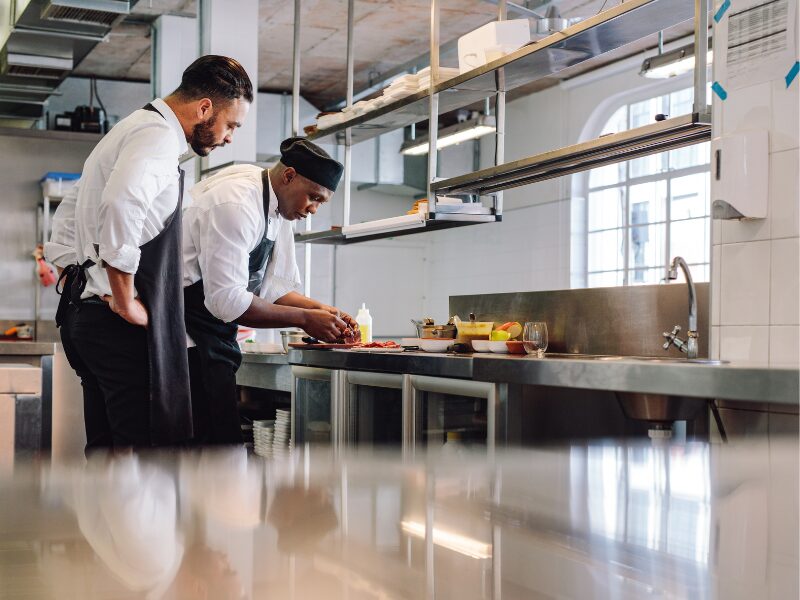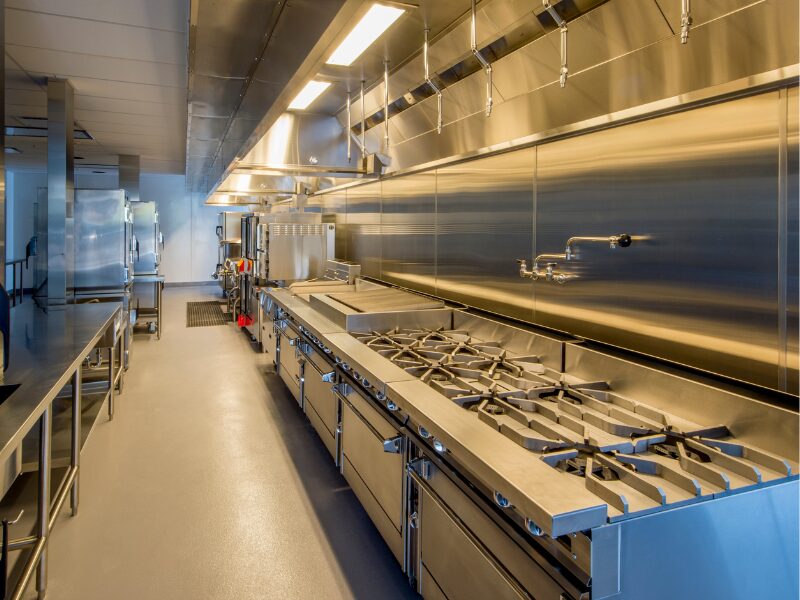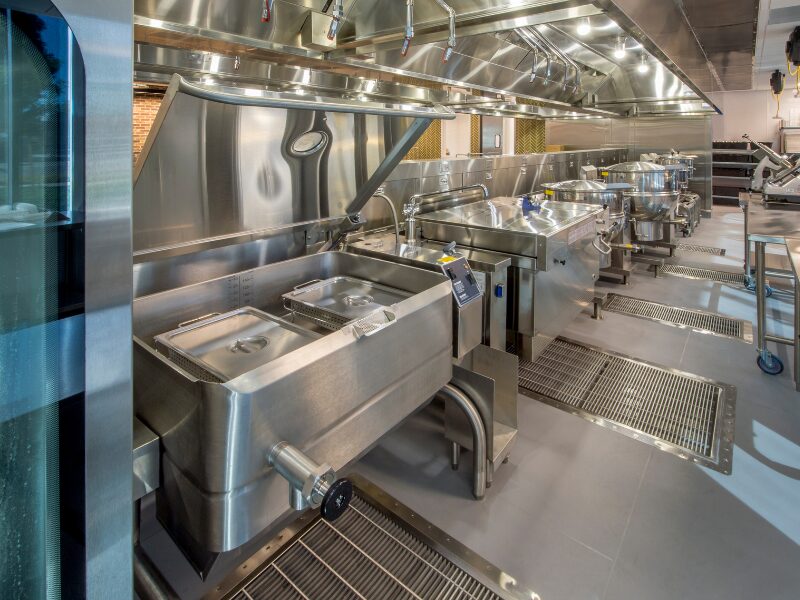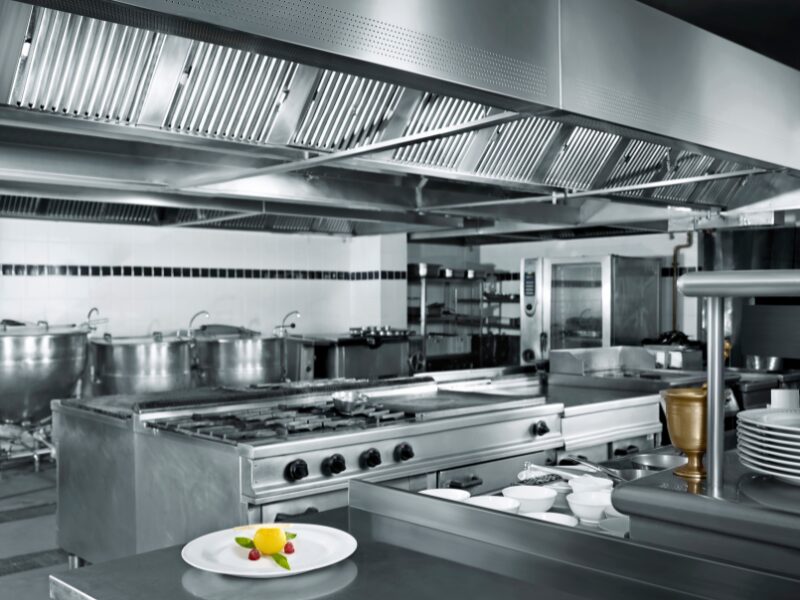Key Takeaways
- With commercial kitchen equipment financing, hospitality businesses can get the tools they need without having to pay for them upfront.
- You can get loans for most kinds of commercial kitchen equipment (like ovens, fridges, dishwashers, and more).
- Chattel mortgage and leasing are the two ways to get the kitchen equipment you need. These two have their own pros and cons.
- Chattel mortgage gives you instant ownership and may let you deduct interest and depreciation from your taxes.
- Leasing equipment lets you keep your money and upgrade your appliances easily, with set monthly payments.
- Interest rates usually range from 5% to 20% per year, depending on the type of business you have and the lender.
- Businesses of all ages, including restaurants, cafés, and caterers, can apply for equipment financing.
- There aren't many government grants, but there are tax breaks like instant asset write-offs or rebates for energy-efficient appliances.
- Leasing is great for people who want to be able to change things up and get new equipment regularly. Chattel mortgages are better for people who want to own equipment for a long time.
- A broker like Dark Horse Financial can help you get better rates, get things done faster, and get advice that is specific to your needs.
If you own a café, restaurant, catering business, or takeaway shop, it’s very important to have the right tools in your commercial kitchen. But the high costs of fit-outs and equipment can put a lot of stress on your cash flow. That’s why businesses all over Australia should think about getting commercial kitchen equipment financing.
We’ll talk about how financing for commercial kitchen equipment works, look at the two main types of financing, and help you choose the one that works best for your business.
What Is Commercial Kitchen Equipment Finance?
Commercial kitchen equipment finance is a way for food and hospitality businesses to buy or rent important kitchen equipment without having to pay for the whole cost all at once.
You can get financing that fits your needs instead of using up all your cash. This will help you buy ovens, refrigerators, fryers, dishwashers, grills, benchtop appliances, and more.
In Australia, the two most common ways to finance commercial kitchen equipment are through chattel mortgages and equipment leasing.
Why Use Commercial Kitchen Equipment Financing Solutions?
Investing in commercial kitchen equipment using finance has several clear advantages for hospitality businesses:
- Preserve cash flow by spreading out repayments.
- Access higher-quality equipment that may otherwise be unaffordable upfront.
- Grow or scale your business
- Upgrade outdated appliances to improve performance and efficiency.
- Take advantage of tax benefits, such as claiming interest and depreciation.

Chattel Mortgage for Commercial Kitchen Equipment
In Australia, a chattel mortgage is one of the most common ways to pay for commercial kitchen equipment. The lender gives the business money to buy equipment, and the business owns it right away. The lender puts a mortgage on the equipment, which serves as security until the loan is paid back.
How Loans for Restaurant Equipment Purchase Work
- You select the kitchen equipment you want to purchase.
- The lender provides funds for the purchase.
- You own the equipment from day one.
- The equipment acts as security for the loan.
- You repay the loan in regular instalments over a fixed term.
Benefits of Chattel Mortgage
- You own everything from the start, so you have full control over your assets right away.
- You might be able to get GST, depreciation, and interest on the loan.
- Because it’s a secured loan, rates are often better than they would be for an unsecured loan.
Best For
- Businesses with stable cash flow.
- Operators who want long-term control and ownership of their kitchen equipment.
- Companies looking to maximise tax deductions through asset depreciation.
Equipment Leasing for Commercial Kitchens
Another good way to get commercial kitchen appliances without paying a lot of funds up front is to lease them. When you sign a lease, the lender buys the equipment and lets your business use it for a set amount of time. You pay your lease payments on time and return or upgrade the equipment when the lease is up.
How It Works
- You choose the kitchen equipment you need.
- The lender buys the equipment and leases it to your business.
- You make fixed monthly payments over the lease term.
- At the end of the lease, you can choose to:
- Return the equipment
- Extend the lease
- Purchase the equipment (if an option is included)
Benefits of Equipment Leasing
- Payments stay the same every month for simple budgeting and predicting cash flow.
- You can upgrade your equipment when the lease ends.
- You might be able to write off all of your lease payments as business expenses.
Best Suited For
- Restaurants that want to keep their appliances up to date.
- Companies that need high-tech or energy-efficient tools but don’t want to own them.
Comparing Chattel Mortgage and Equipment Leasing
Main Differences
- Ownership: You own the equipment outright from the start with a chattel mortgage. The lender owns it during the lease period.
- Tax treatment: You can deduct depreciation and interest on a chattel mortgage. Most of the time, you can fully deduct your lease payments.
- Flexibility: Leases are more flexible because they make it easier to upgrade. Mortgages, on the other hand, give you long-term value by letting you own the property.
Which Option Should You Choose?
Choose chattel mortgage if:
- You want to own the equipment.
- You’re planning to use the equipment long term.
- You want to claim depreciation and interest for tax purposes.
Choose equipment leasing if:
- You need flexibility.
- You prefer not to commit to ownership.
- You plan to upgrade equipment regularly.

What Equipment Can Be Financed?
You can finance a wide range of commercial kitchen appliances and tools, including:
- Commercial ovens, stoves, and cooktops
- Refrigeration and freezer units
- Rangehoods and exhaust systems
- Deep fryers and grills
- Commercial dishwashers
- Benches, sinks, and prep stations
- Coffee machines and beverage dispensers
- Food processors and mixers
- Display cabinets and counters
Both new and used equipment can be financed, depending on the lender’s criteria.
Who Can Apply for Commercial Kitchen Equipment Finance?
Businesses across the food service industry can access commercial kitchen equipment finance. This includes:
- Restaurants and cafés
- Catering companies
- Takeaway shops
- Food trucks
- Pubs and clubs
- Hotels and event venues
What are the Interest Rates for Commercial Kitchen Equipment Loans?
Depending on the following, interest rates for loans for commercial kitchen equipment usually range from 5% to 20% p.a. per year:
- Type of finance
- Your business’s financial and credit profile
- The age and type of equipment
- Loan term and repayment structure
- Lender’s policy
If you work with a broker like Dark Horse Financial, you can get competitive rates from a lot of lenders, both banks and non-banks.
Are There Government Grants Available for Restaurant Equipment Financing?
There are no grants just for commercial kitchen equipment, but some businesses may be able to get help through larger programmes:
- Instant Asset Write-Off: Depending on ATO rules, small businesses may be able to get an immediate deduction for equipment that costs less than a certain amount.
- Energy Efficiency Grants: Local and state governments may give rebates for appliances that use less energy.
Always check the government’s grants and programmes finder to see if there are any grants for your business in your area.

Frequently Asked Questions
How can you pay for the equipment you need for your commercial kitchen?
You can either rent the equipment with an equipment lease or buy it with a chattel mortgage. Your cash flow, tax strategy, and long-term equipment needs will help you decide which option is best.
Can restaurants rent kitchen tools instead of buying them?
Yes. Many restaurants like to lease because it saves them money up front and lets them upgrade their equipment more often.
How much can I borrow at the least or most?
The amount you can borrow depends on the lender and whether you want a low-doc or full-doc loan. You can get low-doc or no-doc loans for up to $500,000 to buy equipment.
Can I get a loan for used equipment?
Yes, a lot of lenders will let you finance good used equipment, especially with a chattel mortgage. But whether or not you can get it may depend on how old and how well the equipment is working.
How can I get affordable financing for food service equipment?
You can get good interest rates, flexible terms, and financing options made just for food service businesses by working with a broker like Dark Horse Financial.
Are there ways to get money for new restaurant businesses?
Yes, new restaurants can get financing in a number of ways, such as by leasing equipment or taking out a chattel mortgage. If you work with an experienced broker, they can help you make a strong application with a business plan and financial forecasts, which will increase your chances of getting approved.
To Sum it Up
With commercial kitchen equipment financing, restaurants, cafés, and food service businesses can acquire the equipment they need without putting their cash flow at risk. You can choose between a chattel mortgage and an equipment lease to set up your payments in a way that helps your business goals, whether you want to own the equipment for a long time or be able to make changes as needed.
Get a Commercial Kitchen Equipment Loan
We specialise in helping businesses in the food and beverage industry find the right financing for equipment purchases. If you need to outfit your kitchen with the right appliances and tools, now is the time to find the best lenders and loan products available in Australia. Talk to us today to learn more.
Disclaimer: Loans and the benefits associated with them are only available to those who have been approved. The information provided on this page is general and does not consider your individual circumstances. It is not meant to serve as a substitute for professional advice, and you should not rely on it for any decisions. Always consult with a professional regarding finance, tax, and accounting matters before making any choices or taking action.




